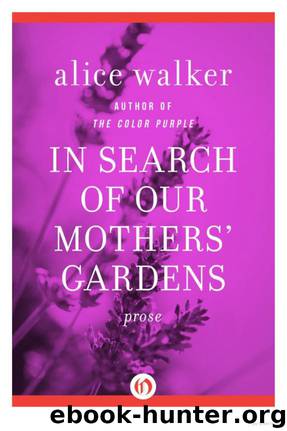In Search of Our Mothers' Gardens: Prose by Alice Walker

Author:Alice Walker [Walker, Alice]
Language: eng
Format: epub, azw3
Tags: Social Science, Women's Studies
ISBN: 9781453224069
Google: 53eAjaQ8i0IC
Amazon: 0156028646
Publisher: Mariner Books
Published: 2003-05-19T00:00:00+00:00
PERHAPS I SAW Angela Davis at the festival. Perhaps we met. She was not ANGELA DAVIS then. Impressed by the Cubans, I too joined the conga line and danced my way through the chilly Helsinki streets. This was my first trip abroad, financed by remarkably generous women of Atlanta’s black churches, who supported me and another young woman from Spelman College in our desire to see the world from another continent and demonstrate—after the United States resumed nuclear testing in 1961—our commitment to world peace.
Although in 1962 Angela Davis and I were both eighteen years old, her political autobiography proves she was far more politically mature than I. She appears to have grasped the international nature of oppression while I could barely see beyond the struggle of black people in the small towns of Georgia. Indeed, I was so ignorant of history and politics that when I left the festival, went to Moscow and was taken on a stroll across Red Square, I could not fathom for the longest time who the Russians were queuing up to view in Lenin’s tomb.
And yet, I knew enough to know I wanted the world to survive (though, ironically, I was myself at this time illogically suicidal). I wanted peace and the abolition of the possibility of nuclear war. And I believed my job at that point (being powerless to do much else) was to begin to see other peoples not as strangers but as kin.
My sense of the Cubans’ spiritedness stayed with me. One of them gave me a copy of Fidel Castro’s History Will Absolve Me, which I read in a tiny, wood-paneled compartment of a Russian train winding its way across the spectacular Crimea, and I read and cried, cried and read, as I recognized the essence of a struggle already familiar to me. In this passionate defense of the Cuban people’s right to revolt against tyranny, I could not help but hear the voices of Nat Turner, Harriet Tubman, Sojourner Truth, Frederick Douglass, Malcolm X, and, especially, Martin Luther King, Jr., whose 1963 “Letter from a Birmingham Jail” would so closely resemble it.
By making their revolution, the Cubans proved that oppression needn’t last always. Three years after the beginning of the revolution, they had also begun to kick out of their country the greedy and antisharing. Which is to say, they had begun “to overcome.” This was profoundly important to me. I think part of my “illogical” despair had been due to my sense of political powerlessness, caused to some extent by a lack of living models. I believed poor people could not win. (And, in fact, no matter how many people, poor or otherwise, protested against nuclear testing, the testing—both in the United States and in the Soviet Union—continued.) But here at last was a revolutionary people I could respect, and they made it quite clear they did not intend to lose.
For several years, I tried to get to Cuba. Because the Cuban Revolution had been achieved through armed
Download
In Search of Our Mothers' Gardens: Prose by Alice Walker.azw3
This site does not store any files on its server. We only index and link to content provided by other sites. Please contact the content providers to delete copyright contents if any and email us, we'll remove relevant links or contents immediately.
| African-American Studies | Asian American Studies |
| Disabled | Ethnic Studies |
| Hispanic American Studies | LGBT |
| Minority Studies | Native American Studies |
Cecilia; Or, Memoirs of an Heiress — Volume 1 by Fanny Burney(32536)
Cecilia; Or, Memoirs of an Heiress — Volume 2 by Fanny Burney(31933)
Cecilia; Or, Memoirs of an Heiress — Volume 3 by Fanny Burney(31925)
The Great Music City by Andrea Baker(31908)
We're Going to Need More Wine by Gabrielle Union(19028)
All the Missing Girls by Megan Miranda(15915)
Pimp by Iceberg Slim(14476)
Bombshells: Glamour Girls of a Lifetime by Sullivan Steve(14046)
For the Love of Europe by Rick Steves(13845)
Talking to Strangers by Malcolm Gladwell(13339)
Norse Mythology by Gaiman Neil(13331)
Fifty Shades Freed by E L James(13225)
Mindhunter: Inside the FBI's Elite Serial Crime Unit by John E. Douglas & Mark Olshaker(9310)
Crazy Rich Asians by Kevin Kwan(9271)
The Lost Art of Listening by Michael P. Nichols(7485)
Enlightenment Now: The Case for Reason, Science, Humanism, and Progress by Steven Pinker(7303)
The Four Agreements by Don Miguel Ruiz(6735)
Bad Blood by John Carreyrou(6608)
Weapons of Math Destruction by Cathy O'Neil(6257)
